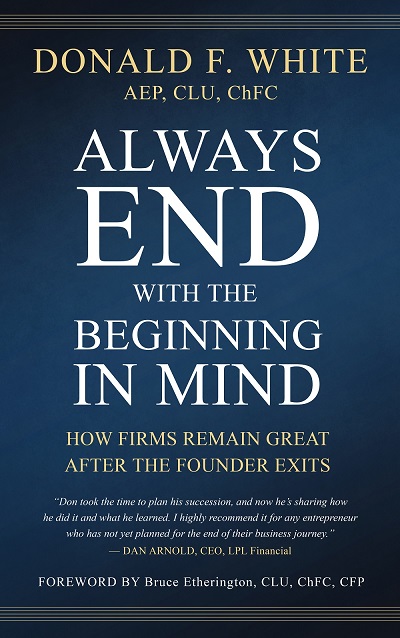
If the title of CEO Donald F. White’s new book isn’t indicative of what to expect within its pages, it’s hard to know what is. Always End with the Beginning in Mind: How Firms Remain Great After the Founder Exits brilliantly articulates, akin to a thesis statement or log line, the entirety of what White has developed as an elaborate, all-encompassing philosophy to approaching leadership roles within the corporate stratosphere. But don’t be fooled by the purposefully long title, the book is a breeze of a read in the best possible sense. White truly isn’t interested in flaunting any high-handedness or sense of specific, exclusionary terminology for a specific sort of audience. The only thing you will find peppered throughout the book is evocative, Biblical examples – interestingly enough proving to be a surprisingly apt translator for otherwise generalized and wide-ranging concepts best suited for selective audiences specializing in said fields.
ABOUT THE AUTHOR: https://www.donaldfwhite.com/
White utilizes hands-on, highly personal scenarios concerning both himself and his colleagues to help illustrate his points and lift the read from typically dry, sanitary business advice guide into full-fledged inspirational non-fiction. While not purporting to be a natural born storyteller, this personal touch makes Always End with the Beginning in Mind feel accessible and even a tad paternal in the best sense. White speaks to the reader like he’d speak to a fellow Christian, not just through his extensive insertion of appropriate, Abrahamic analogical figures but also through his self-deprecating, humble descriptors about his own, shrewd business decisions. This proves to be the book’s secret sauce to appealing to a wide audience, after all seventy percent of the country identifies as Christian and Christian canonical and non-canonical nomenclature timelessly inspires and is referenced throughout various conduits in the present.
AMAZON: https://www.amazon.com/Always-End-Beginning-Mind-Founder/dp/1641463813
White also speaks in a colloquial manner about complex, corporate intrapsychic thought – particularly the value of knowing when to step down from one’s position at the head of the ship. Many of the examples he provides within the book’s chapters echo this philosophy regardless of the specifics. Fundamentally White isn’t as interested in painting an extensive portrait of the how-tos and whys many entrepreneurial figures can lose the reader in when publishing a memoir or entry in the non-fiction sub-genre of business advice. Rather he’s interested in making each of the stories and descriptors revolve around a single, central concept – humility. He’s not alone in stressing the post-modern relationship humility shares with the timeless, traditionally cold-cutting term we all call success.
But unlike many others tackling the importance of this new form of leadership, White never falters in making sure the reader feels constantly reassured of its presence in every chapter. It’s an unusual sort of thematic coherence which makes you feel empowered and genuinely trusting of White, enough so you feel encouraged to follow his methodology and make good choices under his self-christened banner SWEAT (Sights, Work, Encouragement, Acceptance, Tenacity).
Cyrus Rhodes



























